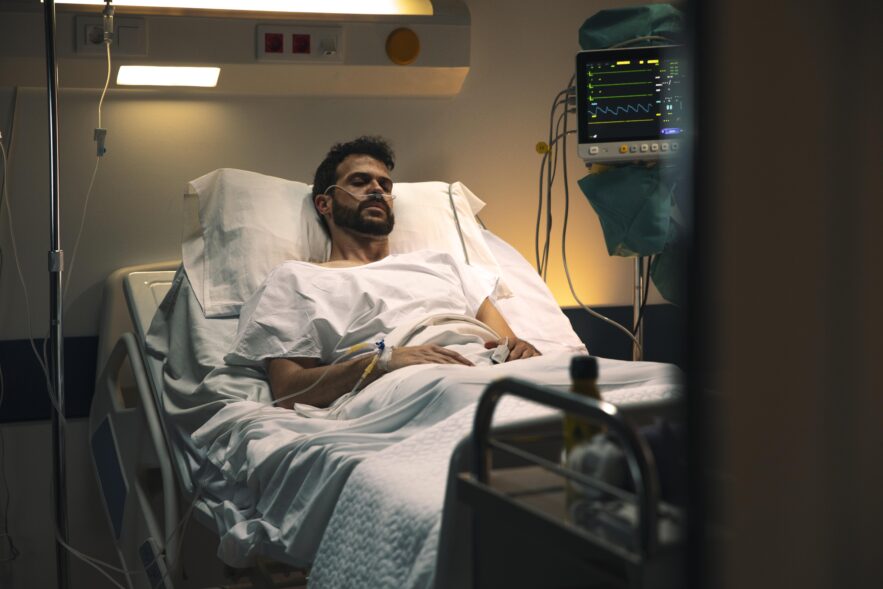By Cynthia Brown : Everyone has a story about the negative side effects of taking medications, both prescribed and over-the-counter. But when it happens to you as a patient in the hospital, the last place you would think of this happening, it gives you pause. At least it did for me. Here’s my story.
It began in the ER, with all the symptoms of my having a heart attack. Not the unusual symptoms, as most women might have, but spot-on symptoms similar to that of a man having a heart attack: severe pain in the middle of my chest radiating out my back, left-arm numbness, profuse sweating, nausea, irregular heartbeat, lightheadedness. Basically, the norm for someone having a heart attack. My EKG showed a few inverted T waves of concern, but was not showing that I was having a heart attack. This did not rule out a heart attack.
Even though my blood pressure was not considered high, the emergency room staff gave me nitroglycerin “just in case.” Because I naturally have low blood pressure, my blood pressure plummeted to an all-time low. Bells and whistles began going off alerting ER staff that something was wrong. I learned that day that nitroglycerin was the “go-to” drug for patients suspected of having, or actually having, a heart attack as side effect, withstanding any other medical factors that would make using nitroglycerin a bad idea, if not a deadly one.
This is where that medical textbook they used back in medical school should have just been thrown out the window, as I was not their normal textbook patient. Low blood pressure can kill a patient just as quickly as high blood pressure, but many cardiologists and others in the medical field, especially ER staff, fail to recognize this. Sadly, this would not be the only time nitroglycerin would be overprescribed for me during my stay, after being admitted to the hospital with confirmation of having had a myocardial infarction.
Hospitals should not be seen as security blankets, and patients need to be aware of medications being handed out at all times, and ask questions before ever taking any medication.
Once on the cardiac floor of the hospital, the nurse on duty hooked me up to all the usual equipment that is necessary for a heart attack patient. She then placed a nitroglycerin patch on my right arm, and although I did meekly protest after what happened in the ER, I wasn’t patient-advocate enough to make demands just yet. Why would I? I was in a hospital, after all, where they were supposed to know how to care for me, the patient. My electronic medical chart, which they had access to, should have made it clear that I had hypotension, and not hypertension, sending out a bold warning to all those treating me that the use of any form of nitroglycerin would have negative, if not devastating, side effects.
All the normal tests for a heart attack patient were ordered and performed, and I was into my second day as a hospital patient. I kept telling each nurse, as their shifts changed, that I was feeling unusually lightheaded as side effect, to which most replied, “That’s normal for what you’ve experienced.” Vitals were checked frequently, but not one nurse or cardiologist appeared to be concerned that my blood pressure continued to decline with each check. By the time the night nurse came on, I couldn’t even get out of bed to use the bathroom because I was so lightheaded.
Sometime around midnight, I pushed the button to notify the night nurse that I needed her. Thank God I did, and didn’t just go to sleep. I told the nurse that something was just not right — I was feeling dizzy and somewhat out of it while lying in bed, and was concerned. She took my blood pressure again, even though it wasn’t time to. It took her several tries, as she couldn’t believe what she was seeing.
My blood pressure had plummeted to 72/49, which, in her words, were “ICU numbers.” She ran out of the room, notified the on-call cardiologist, and he knows about my dangerously low blood pressure. He suspected the nitroglycerin patch was at fault, and asked for his approval to remove it. It was after midnight on a Saturday, and the cardiologist was upset with the nurse for calling him at that hour for something so minor. He instructed her not to remove the patch and said he would come by first thing in the morning.
I heard the nurse running back down the hall toward my room, where she relayed everything the cardiologist had said, and then quietly asked me, “Do you believe you need that nitroglycerin patch on your arm? Do you think it is helping you at all?” I was stunned, as I was the patient, and what did I know? Well, it turned out this nurse — and I, the patient — obviously knew more than the cardiologist on call. As she turned and was walking out of my hospital room, she looked back at me and said, “If that nitroglycerin patch somehow falls off on its own while you’re sleeping, oh, well.” It was clear to me what she was really saying, so once she was gone, I ripped the nitroglycerin patch off my arm, throwing it on the floor. Within 10 minutes, I began feeling much better, and within a half hour, my lightheadedness was completely gone.
The nurse, who was closely monitoring me from her desk, came back an hour after she had left my hospital room to check my vitals. It was low, but what was considered a normal low for me, not a life-threatening level any longer. As the nurse placed the blood pressure cuff back in its holder, she noticed the nitroglycerin patch was no longer on my arm, then looked at me and winked. I slept.
The wrong medications, or in my case, too much of a medication, can have negative results, and even lead to death if not caught in time. I still to this day believe that had I gone to sleep that night without calling for the nurse, I would not be here today. Hospitals should not be seen as security blankets, and patients need to be aware of medications being handed out at all times, and ask questions before ever taking any medication. What’s this for? What are the side effects? Did my own physician prescribe this medication? And if you are uncomfortable with taking a medication, then don’t. You have the right of refusal when it comes to ingesting any medication into your body, even while in a hospital.







